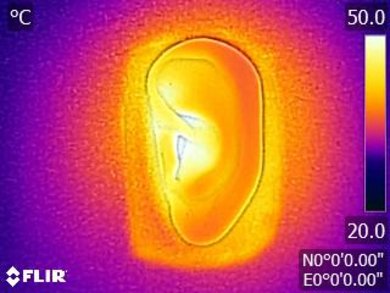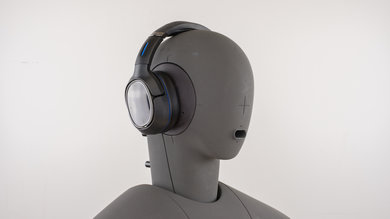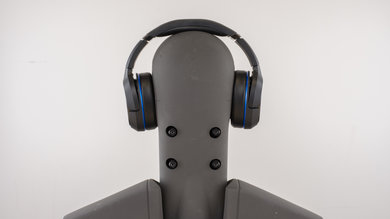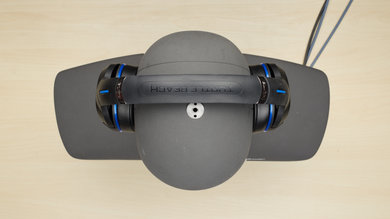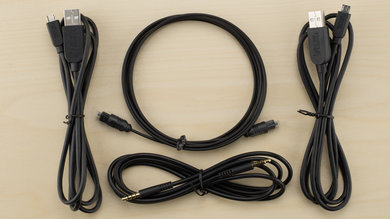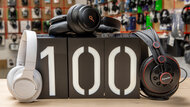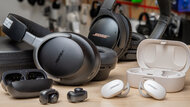The Turtle Beach Elite 800 gaming headset are comfortable and have a lot of features. Unfortunately, they don't have a great sound quality and they don't block a lot of outside noise, even with its active noise cancellation feature. Note that we tested the PS4 variant of this headset, but we expect similar results for the Elite 800X Xbox One variant.
Our Verdict
The Turtle Beach Elite 800 headset are best used as gaming headphones although they do have enough features to be moderately versatile headphones. However, their size makes them a bit cumbersome and not suited for sports or physical activity.
-
Futuristic looking, sturdy design
-
Comfortable
-
Feature packed
-
Poor noise cancellation
-
Average sound quality
-
Overly sensitive controls
Average for neutral listening. They're not designed to deliver the most balanced audio reproduction, and their poor soundstage won't be ideal for neutral listening. On the upside, they have multiple audio profiles and should sound sufficiently decent for most casual listeners.
Decent for commuting. They won't isolate well enough for the noise level of public transit. They're also a bit cumbersome to carry around.
Not made for sports use. Although they have a good wireless range, they're too bulky cumbersome and unstable for sports. They will fall off your head if used while jogging or exercising and their control scheme is not very intuitive.
Better-than-average for office use. They have a good wireless range so you won't be limited to your desk or office. However, they don't block noise well and will let the office chatter seep into your audio. They also leak at higher volumes.
Average for playing video games. They are comfortable, but they have an average sound quality. The latency is low, but only when using the base, it is high via Bluetooth. Their poor imaging makes positioning sound harder in games.
- 6.9 Mixed Usage
- 7.3 Neutral Sound
- 6.8 Commute/Travel
- 6.3 Sports/Fitness
- 6.9 Office
- 7.3 Wireless Gaming
- 7.7 Wired Gaming
- 7.1 Phone Call
Changelog
- Updated Nov 21, 2019: Converted to Test Bench 1.3.1.
- Updated Nov 21, 2019: Converted to Test Bench 1.3.
- Updated Feb 16, 2018: Converted to Test Bench 1.2.
- Updated Sep 28, 2017: The microphone has been tested with our new methodology, as explained here
- Updated Aug 10, 2017: Converted to Test Bench 1.1.
Check Price
Compared To Other Headphones
See our recommendations for the best gaming headsets, the best PS4 headsets, and the best gaming headsets for PC.
The Astro A50 Gen 4 are better gaming headphones than the Turtle Beach Elite 800 Wireless. The Astro have lower latency, which is great for wireless headphones, and they are noticeably more comfortable and better built. They also have a microphone that delivers superior overall performance. On the other hand, the Turtle Beach are Bluetooth compatible and can also be used wired, so they are a bit more versatile than the Astro. Although mediocre, the Turtle Beach also have a noise cancelling feature that isolates more against ambient noise than the Astro.
The Astro A50 Gen 3 are better gaming headphones than the Turtle Beach Elite 800 Wireless. The Astro have lower latency, their build quality is far superior, they feel sturdy, and they should feel way more comfortable for most people. Their sound profile is also well-balanced and more accurate. However, you can’t use the Astro wired like the Turtle Beach, and you can’t stream music via Bluetooth while gaming. The Turtle Beach are a more versatile headset due to this and don’t have such a bulky and gaming-minded design. They are also noise cancelling and block more ambient noise than the Astro. For gaming online with friends, the Astro have a better microphone.
The Turtle Beach Stealth 700 Wireless and Turtle Beach Elite 800 Wireless are very similar gaming headsets. Both have decent performance, but the recording quality of the Stealth 700’s mic is better but doesn’t handle noise as well as the Elite 800. Both control schemes offer plenty of options, but the Elite 800 are hard to use, and the feedback is bad. On the other hand, the Elite model has an ANC feature, but it struggles to reduce background noise. Overall, both headsets are fairly cheaply made and may not be worth the investment.
Test Results
The Elite 800 look and feel futuristic. The matte, all-black finish is accentuated by blue highlights around the ear cups and headband. The glass-like finish on the ear cups cover the controls and add to the futuristic aesthetic. They look good for use as a gaming headset, but a little bulky for regular headphones.
The Turtle Beach Ear Force Elite 800 have a lot of controls, from call controls to noise cancelling. However, they are extremely sensitive to pressure, to the point that even placing them on the table (buttons facing down) could trigger them.
The Elite 800 take up a lot of space and are not portable. They're bigger than your average over-ear headphone and don't fold flat or into a more compact format for easy transportation. This means you may need a relatively large bag to carry them around.
They do not come with a case or a carrying pouch, but you can place them on the included base while charging.
The pads and the latex headband have a nice feel to them. The plastic parts are pretty good too, but seem a little cheaper. Although the headband makes a loud click while adjusting, the notches are too close to each other to be easily distinguishable. Also, the headband tends to shift pretty easily and is not always stable.
These headphones are not stable on the head. They are not designed for sports. They are bulky and heavy, and the large ear cups sway a lot when you move too quickly. They are somewhat stable during casual gaming sessions, as long as you have them on correctly. On the upside, they're wireless, so the cable won't pull on them.
The frequency response of this gaming headset is consistent across our five measuring subjects. The sound quality is the same no matter your head shape or where you place them on your head.
The bass is great and not overpowering. It extends quite low, so you will feel the rumbles in video games.
The mid frequencies are average. There is a dip at 400Hz - 500Hz which results in the loss of some content in the sound. This dip is fairly narrow, so it is not a deal breaker.
The treble is mediocre and muted. These headphones sound dark and are missing some details in the high frequencies.
The noise isolation is mediocre. The ANC (Active Noise Cancelling) seems to be generating artifacts at around 20Hz, which may be audible. Overall, it does block some noise and it will work at home, but it is not comparable to a real noise cancelling headphones like the Bose QuietComfort 35. There is also a noticeable and consistent white noise when you turn on the noise cancelling. It is possible to use the built-in microphone to open up the headphones to the surrounding sounds for having a conversation.
These headphones leak an average amount of sound. They start leaking at around 200Hz, but it doesn't become significant until 1.5KHz. From there and up to 5KHz (where sibilant sounds sit) the leakage increases noticeably. Someone sitting next to you will hear what you are listening at high volume.
The microphone quality is decent. The recording quality is below average due to the limited wireless bandwidth, but it does a great job at isolating the outside noise and picking up only your voice.
The quality of the recording of the microphone of the Turtle Beach Elite 800 is below average. It doesn't have any bass or treble, which makes the voice sound thin.
The microphone does a great job at isolating the voice. It won't pick up too much the outside noise or your neighboring players. It is not as great like the headset with a boom microphone, but it is close.
The Elite 800 have an average battery performance. They have a decent battery life for a gaming headset at 10.8 hours however they take quite a bit of time to charge and do not have an auto-off feature to save power. On the upside, they can stream audio while charging, so you can continuously game or play music if you have them plugged into a power outlet.
The Elite 800 supports the Turtle Beach audio Hub with even more features than the when paired with the Stealth 700 or Stealth 600. You have the option to choose between many different preloaded games and chat prests. You can also control the level of voice prompts and microphone monitoring options. It's a decent app with decent features, but it's not the most well-designed software. Also, updating the headset is a bit convoluted as you need to plug both the headset and the transmitter (in the program only port) to different USB slots on your PC.
Using the RF base, the latency is low, which is great for gaming when connected via the optical audio connection from either the PS4 or a PC. Using Bluetooth, the latency is quite high (187 ms) which will be noticeable to some gamers. Unfortunately, it doesn't support the lower latency aptX codec.
Comments
Turtle Beach Elite 800 Wireless: Main Discussion
Let us know why you want us to review the product here, or encourage others to vote for this product.




